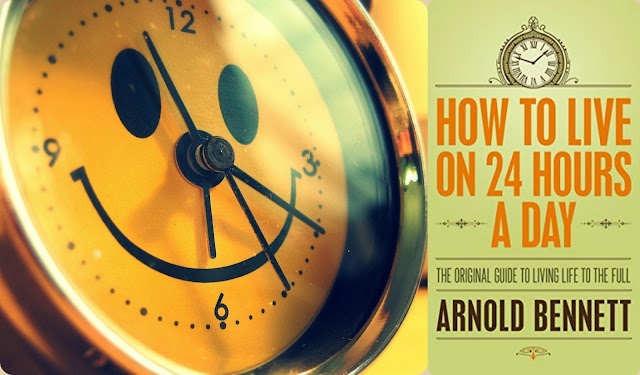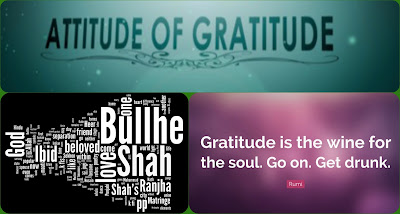Book Review #2: Philosophical & humorous take on famous time management
This book - “How to live on 24 hours a day” is about how to use your time more effectively during a working week. It’s a philosophical, deeply humorous call to action: to take responsibility for how you spend your days, stop lamenting the lack of time available to you.Written in 1908, it’s a searingly perceptive and no-nonsense account of how we commonly use time as an excuse for failing to live life to the full – and it’s just as accurate today as it was at the turn of 20th Century.
This book doesn’t offer tips and techniques for time management, productivity or successful multitasking. The author, Arnold Bennett, doesn’t try to make you better at managing the precious 24 hours you’ve been given. What he does instead is highlight the fundamental ideas behind time management – the internal battles, questions, and liberating concepts that help us all to reclaim our status as agents of our own destinies.
It’s a short read at 32 pages, but it packs a punch, eliciting both peals of laughter and moments of sacred recognition. Bennett covers a vast array of subjects in this brief gem as to why humanity is so obsessed with time, and why we never feel like we have enough. How taking control of your own mind is the key to taking back your time; the fact that 'nothing is humdrum'; and dangers to avoid like over-scheduling, future gazing, and mocking other people for their time-wasting behaviors.
The book starts with explaining how time is a daily miracle and how it is wasted and taken for granted resource. The author, Arnold Bennett, explains this miracle with the following statements:
“Philosophers have explained space. They have not explained time. It is the inexplicable raw material of everything. With it, all is possible; without it, nothing. The supply of time is truly a daily miracle, an affair genuinely astonishing when one examines it.
You wake up in the morning, and your purse is magically filled with twenty-four hours of the unmanufactured tissue of the universe of your life! It is yours. It is the most precious of possessions. A highly singular commodity, showered upon you in a manner as singular as the commodity itself! No one can take it from you. It is unstealable. And no one receives either more or less than you receive.
No mysterious power will say:—"This man is a fool, if not a knave. He does not deserve time; he shall be cut off at the meter." It is more certain than consoles, and payment of income is not affected by Sundays. Moreover, you cannot draw on the future. Impossible to get into debt! You can only waste the passing moment. You cannot waste to-morrow; it is kept for you. You cannot waste the next hour; it is kept for you.”
The author then proceeds to say, (and he personifies a skeleton, pointing his finger at us in a tone of mockery), that all people are dissatisfied with their use of this so precious gift. That one who wishes to go to Mecca and never leaves Briton lives with the perpetual torment of lack of accomplishment, and is worse off than the man who died along the rough trail. (No religious Offense - Just an example in the book)
Any finite amount of accomplishment would only recognize a lack of a greater amount of it, and thus, the author proposes, we must learn to live with it. To always live, and enjoy living, accomplishing what we may, inspecting life with a childish curiosity and joy, and yet, be content with the fact that we will never satisfy ourselves with our accomplishments.
"Let me principally warn you against your own ardour. Ardour in well-doing is a misleading and treacherous thing. It cries out loudly for employment; you can't satisfy it at first; it wants more and more; it is eager to move mountains and divert the course of rivers. It isn't content till it perspires. And then, too often, when it feels the perspiration on its brow, it wearies all of a sudden and dies, without even putting itself to the trouble of saying, "I've had enough of this."
The author says that there is no magic method of beginning instead he questions you that at the end of a workday, you have more energy than you want to admit: How is it that when you come home at the end of a day in the office, you slump down, seemingly exhausted, and tell yourself you should rest because you’ve had such a long day, and yet when you have a party to attend on a Friday night you seem to have all the energy in the world?
Arnold Bennett suggests us that we all should stop feeling hard done by ending the glorification of busy. We all have the same amount of time to play with. And ultimately, you are the only person who gets to choose how you spend yours. That’s a pretty magical gift.
Arnold Bennett suggests us that we all should stop feeling hard done by ending the glorification of busy. We all have the same amount of time to play with. And ultimately, you are the only person who gets to choose how you spend yours. That’s a pretty magical gift.
Don’t try to bite off more than you can chew. If you want to start doing something new, give yourself space to do it slowly, badly, uncomfortably. The most important thing is that you do it consistently:
“Let the pace of the first lap be even absurdly slow, but let it be as regular as possible”
There is serious emphasis on the removal of all instances of merely "wasting time". Constantly, you should be 'alive', not merely existing. To be alive does not at all mean advancement towards accomplishment, as that is not a source of life, though it should be a product of it, but rather, to do something of value and to enjoy doing it.
Bennett warns us not to be too ambitious in our attempt to live, fail, and revert to our prior state of sleepy existence. He cautions us to remember human nature, to allow room for failure and mistake. What a magnanimous change of direction it is to transform your entire life from a state of passivity to active, strenuous living! Always try hard, allow room for failure, and when it does show its face, (for it can never be entirely killed, but it can be reduced), do not drop your whole endeavor, do not shame yourself, make note of how that particular instance could be avoided, pick yourself up again, and keep at it.
He then goes on to say that nothing in life is "humdrum", that all things follow the universal Law of Causation. All things can be enjoyed and examined through this lens, that all effects have a cause, and that they themselves are a cause. Virtually anything can be learned from through this lens, except logic and free will, and thus this nullifies the statement that something is pointless, "humdrum" or boring.
It is concluded by a series of warnings. The fist of which is important to know, heed, and take to heart, to not become a snobby, know-it-all brat. You will have no positive relations with anyone except your own admiring reflection.
Secondly is to note that you should maintain your routine and not worship as an object of religion, or give it so much priority that you cease to do other things of importance such as visiting a friend who comes to town and lives miles away, or such. Effort and regularity are what your routine should be constituted of, not obsessive adherence to.
It is even noted that you will defeat your own ends by thinking about your routine, and not what it is constitutes. If in the process of doing your 'step 1', all you are thinking about is your timing in relation to 'step 2', then step one would have been entirely wasted. Avoid this. He also says not to try to go from one to the next with hurried impatience and too much attention to your effort, and not on that which you are doing.
I felt there was much to be said that wasn't, and what was may have been quite incomplete. I do appreciate the "short and sweet" essence to it, but something so serious as living life to its fullest ought to be given more attention. More could have been said of what 'living on 24 hours a day' would look like in detail, more examples of the right ways of doing something, except for that the suggested 'three hours in the evening' would add zest and enrichment to the entire day.
Even though these two things, Reading and Reflecting, are of immense value, there is much, much more to life than merely reading and reflecting, and the book certainly could have covered what it did cover more thoroughly, and much more could have been said.
Howbeit, the message that it does convey is of such great importance that this easily deserves a good review and at least 4 stars.
A positive point would be the matter-of-fact, curt manner of speaking in which the author employs his message. It does make it easier to follow, and I absolutely appreciate that it isn't written with the frilly, weenie sort of means, which tolerates anything and everything. It's more of a "get off your ass and start living!" than a "come on, you can do it! I know it's SO hard, but you've got to try. It's okay, just keep at it". What little is said, is communicated well.
Considering that it would take you perhaps an hour to read this, I would absolutely encourage you to do so, and heed what it says! This certainly a worthy use of your time. Go grab a copy of this or contact me for the eBook version of it.







